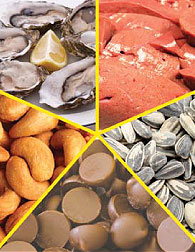Got Copper (In Your Diet)?
 High-resolution version of this photo.
High-resolution version of this photo.How important to your health is copper? Could it reduce the risk of osteoporosis and slow the rate of bone loss, or lower the incidence of cardiovascular disease, or reduce pregnancy complications?
Copper's role in our daily diet is becoming a focus of research into the causes and prevention of degenerative diseases related to aging. Because the average age of the U.S. population is increasing - as the Baby Boom generation moves into and beyond middle age - information regarding proper copper consumption has become a growing concern.
"Lack of copper is a significant health risk," says Carl Keen, Ph.D., chair of the Department of Nutrition and professor of Nutrition and Internal Medicine, University of California at Davis.
As an element found in thirteen key enzymes in the body, says Keen, "copper is essential for prenatal development, bone growth and strength, helping to fight off cell damage and for transport and absorption of iron." Enzymes create reactions within cells, such as converting sugars into energy, and are critical for bodily function.
COPPER DEFICIENCY ISSUES
Humans need copper to develop firm skin, bones and other connective tissues like cartilage and ligaments. The presence of copper is especially important in enzymes that form strong bonds (called cross-links) within collagen and elastin, which support and add resilience to connective tissues.
Copper's role in forming strong tissue is the reason it is used in treating osteoporosis. "Marginal copper deficiency is seen by some scientists as a risk factor for the development of osteoporosis, which makes sense because of the need for cross-linking in bone tissue," Keen says. "Evidence suggests modest copper supplements reduce the rate of bone loss."
"Because vascular tissue also needs healthy cross-links, copper deficiency may contribute, in some people, to cardiovascular disease," he adds.
Copper is also necessary to create antioxidant enzymes that remove excess "free radicals" in the body. Free radicals are unstable atomic ions destructive to cells. Researchers believe these particles damage human DNA, which controls cell growth, and that heart and lung diseases, cataracts and the general wear and tear associated with aging may all be linked to excess free radicals.
Because copper can offset this process, it is regarded by scientists as a potential ally in the war on cancer. However, as Keen notes, "It is premature to say that copper deficiency contributes to cancer. Research in this area is ongoing."
WHAT IS ENOUGH?
Copper-rich foods include grains, nuts and seeds, organ meats such as liver and kidneys, shellfish, dried fruits, legume vegetables like string beans and potatoes, chicken and some unexpected and delightful sources such as cocoa and chocolate. Vegetarians generally get ample copper from their diet. However, when foods
and vegetables are processed, they lose some of their beneficial nutrients and
metals, says Keen.
The correct amount of daily copper intake depends on a person's age and reproductive status. The Recommended Dietary Allowance (RDA) for copper established by the National Academy of Sciences is 0.9 mg per day for men and women between the ages of 19 and 70. A daily intake of 1.0 mg for pregnant women and 1.3 mg. for nursing mothers is recommended. Children between 9 and 18 need only 0.7 mg to 0.89 mg per day, and younger children need even less.
BALANCE IS IMPORTANT
Research also points to the importance of balancing the amounts of metals used by the body. "Without copper, iron cannot be properly converted to its usable form and absorbed by the body," explains Keen. "Too much zinc inhibits the body's ability to absorb copper." According to the National Academy of Sciences, a proper daily balance for adults is 0.9 mg of copper (male and female), 8 mg (male)/18 mg (females 19-50) of iron, and 8 mg (female)/11 mg (male) of zinc.
Ingesting more copper will not help you more. "If you have enough, taking extra will not provide additional benefits," says Keen, adding that getting too much copper in one's diet is unlikely. "I wouldn't worry about copper toxicity - it doesn't occur too much. I'd worry more about copper deficiency."
Approximately one-third of the copper used in our bodies is found in skeletal muscle tissue, another third in the brain and liver and the remaining amount in bone and other tissues, according to Northwestern University's Feinberg School of Medicine.
WHY ALL THE ATTENTION NOW?
Nutritionists now realize that the accepted wisdom fifteen years ago - that the amount of copper we got from food was adequate - is no longer the case. There is growing acceptance that marginal copper deficiency is a risk factor in pregnancy complications and damage from free radicals.
Also, today we expect our diet to do more for us. People used to want the nutrients found in foods and supplements to ensure that they weren't vitamin-deficient. "The new nutrition has to do with reducing the risk of developing chronic diseases associated with age. It's a different paradigm," notes Keen.
"Evolutionarily, we died earlier. Now we're trying to find the optimal diet for people in their fifth, sixth, seventh and eighth decades of life." Cu
Resources:
Also in this Issue:
- Got Copper (In Your Diet)?
- Copper Ions Keep Roofs Clean
- Heating and Cooling "Green" With Copper
- A Copper Dollar in Your Pocket
- Building Better Bridges

 Many of the different foods rich in copper
Many of the different foods rich in copper